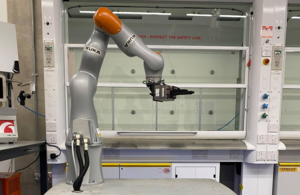£1.02 million research funding awarded for robotic chemist project
Dstl (Defence Science and Technology Laboratory) is pioneering the use of autonomous mobile robotics within the scientific research laboratory.

To continue to deliver critical analytical capability for chemical, biological and explosives analysis, Dstl is working with industrial and academic partners to develop the application of mobile robotic platforms in laboratory (lab) environments. The majority of the £1,020,000 funding for this 2 year project is provided by the Defence Innovation Unit, with support from Defence Equipment and Support, and the Department for Transport.
Robots have been used in a range of industries for a number of years and fixed systems have even found some use within lab environments.
Dstl is driving forward the application of fully mobile, autonomous systems within its highly regulated high-hazard laboratory environments. Such systems could perform routine and repetitive tasks increasing the value of its human counterparts who would be able to focus on more complex analytical activities. Furthermore, the use of a robot to collect data will have positive implications on reproducibility and repeatability for some tasks and would increase capacity during periods of high demand.
Following a competitive tendering process Dstl has let a contract with the University of Liverpool and its start-up company Gearu Robotic Research. The purpose is to identify the optimal robotic solution to conduct 2 chemical processes, one related to the analysis of environmental samples and the other to the analysis of explosives, to define a follow on contract to complete the project.
Challenges for the robot in the workflow process and in the regulatory environment have already been identified but are being overcome collaboratively. The first report on the scope of what is possible is currently being reviewed by Dstl staff and this will help shape when colleagues can expect to see the mobile robotic system working at Dstl Porton Down.
David Groves, a Fellow in the Counter Terrorism and Security Division and the instigator of the project said:
This is an exciting opportunity to be at the forefront of the application of such technology, which has the potential to significantly enhance the efficiency and effectiveness of the delivery of our chemical analysis services for the benefit of all of our Defence and Security customers.